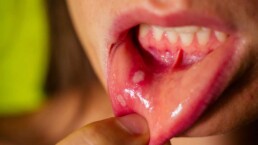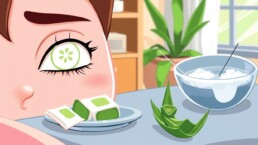High blood pressure, or hypertension, affects around half of American adults and more than 1 billion people worldwide. It’s called the “silent killer” because often people don’t know they have it. Not getting treatment for high blood pressure can lead to increased risk of heart disease, stroke, and other serious issues. But, you can lower your blood pressure quickly at home without medication.
Table of Contents
ToggleWe will talk about different ways to lower your blood pressure at home. Things like deep breathing and drinking enough water. These quick solutions can help right away and improve your heart health in the long run.
What is High Blood Pressure?
Blood pressure is the force of blood on artery walls. It’s like your heart’s push. This force changes during the day. It can go down when you’re calm, and up when you’re stressed. High blood pressure, or hypertension, is when this force stays too high. It can cause big health problems.
Understanding Blood Pressure Levels
There are two blood pressure numbers: systolic (top) and diastolic (bottom). They measure the pressure in different moments. Here’s how we see if blood pressure is normal or high:
- Normal blood pressure: Less than 120/80 mmHg
- Elevated blood pressure: Systolic between 120-129 mmHg and diastolic less than 80 mmHg
- Stage 1 hypertension: Systolic between 130-139 mmHg or diastolic between 80-89 mmHg
- Stage 2 hypertension: Systolic 140 mmHg or higher or diastolic 90 mmHg or higher
Risks and Complications of Hypertension
High blood pressure can cause dangerous health issues. It can lead to heart disease, stroke, and kidney problems. If your reading is above 180/120 mmHg, it’s an emergency. You need to get help right away.

Keep your blood pressure in a healthy range. Watch it often and act fast if it gets high. This can help lower the risks of hypertension.
Immediate Home Remedies to Lower Blood Pressure
If you have high blood pressure without problems, try to stay calm and lie down. Doing deep breathing can lower your blood pressure right away. This is because it helps your body relax. Make sure to drink enough water too. Not drinking enough water can make your blood pressure go up.
Deep Breathing Exercises
Deep breathing is an easy way to bring down your blood pressure fast. Slow, deep breaths make your body relax. Try doing the following:
- Find a comfortable, quiet place to sit or lie down.
- Inhale slowly through your nose, allowing your belly to expand.
- Hold your breath for a few seconds.
- Exhale slowly through your mouth, letting your belly deflate.
- Do this for 5-10 minutes, keeping your mind on your breath.
Stay Hydrated
Drinking water can swiftly lower your blood pressure. It stops dehydration from raising your blood pressure. Always try to drink at least 8 glasses of water each day. If you move a lot or are in a warm place, you’ll need even more.
More ways to lower blood pressure are taking a quick walk, using acupuncture, and drinking hibiscus tea. But remember, these methods are for quick help. They don’t replace seeing a doctor for high blood pressure.

Lifestyle Changes for Long-Term Management
Home remedies can give quick relief. But, for long-term help with high blood pressure, you need to change your lifestyle. A heart-healthy life can lower your blood pressure and keep you safe from its dangers. Here’s how to make lasting lifestyle changes for better blood pressure control.
Maintain a Healthy Weight
Keeping a healthy weight is key for managing high blood pressure. For instance, a waist size over 35 inches for women and 40 inches for men shows a high risk. Eat well and stay active to keep a healthy body weight.
Engage in Regular Exercise
Being active helps a lot with blood pressure. Try to do at least 150 minutes of activities like walking, biking, or dancing every week. It’s not just about heart pumping activities. Doing strength and flexibility exercises is good for your heart too.
Adopt the DASH Diet
The DASH diet is great for high blood pressure. It focuses on healthy proteins like lean meats and plenty of fiber. It avoids sugary drinks and too much salt. Following this diet can help you manage your blood pressure better.
Manage Stress and Anxiety
Stress and anxiety can make your blood pressure worse. Try relaxation methods like meditation, yoga, or deep breathing. These activities help control your blood pressure and make you feel better. Also, getting enough rest is important for managing stress and blood pressure.
Quit Smoking
Stop smoking to lower your blood pressure and reduce heart risks. It’s a big step for your overall health.
With these changes, you can handle high blood pressure better. Be sure to keep up healthy habits and check your blood pressure. Work with your doctor for the best results and a healthier life.
The DASH Diet for Blood Pressure Control
The DASH diet is great for high blood pressure, also known as hypertension. It focuses on eating lots of fruits, veggies, whole grains, and low-fat dairy. It also asks you to avoid foods with lots of bad fats, sugar, and sodium. By eating these blood pressure-lowering foods every day, you can manage and reduce high blood pressure.
Nutrient-Rich Foods for Healthy Blood Pressure
Here are some foods the DASH diet prefers to keep your blood pressure in check:
- Leafy green vegetables like spinach
- Cruciferous vegetables such as broccoli
- Carrots and other orange-colored produce
- Apples, oranges, and other fresh fruits
- Bananas and other potassium-rich foods
- Nuts, seeds, and legumes like beans
- Fatty fish high in omega-3s
Adding these DASH diet foods to what you eat is a good way to handle high blood pressure. It also helps your heart stay healthy.
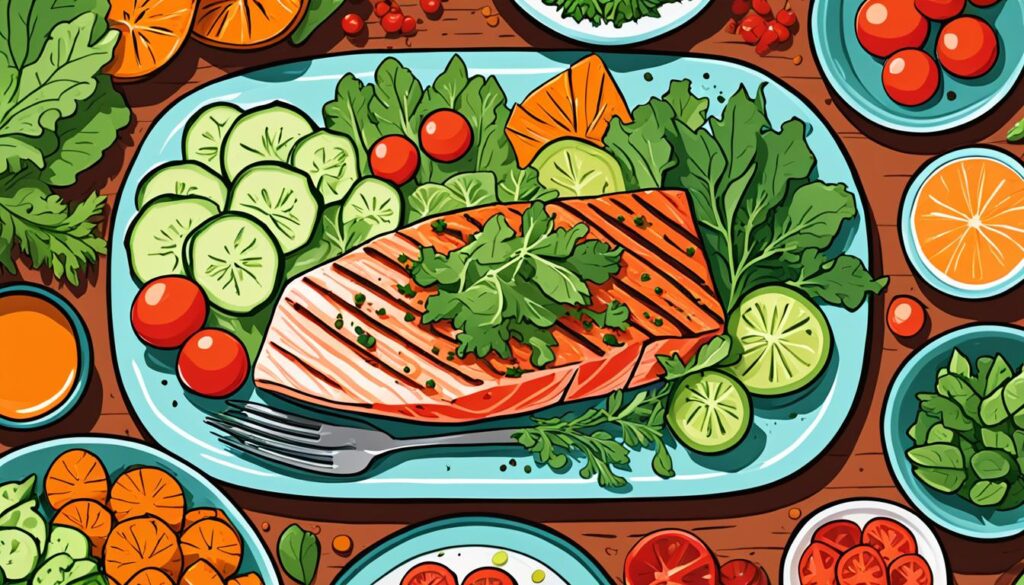
Reducing Stress and Anxiety
Stress and anxiety can spike your blood pressure. Your body makes hormones like cortisol when you’re stressed. These hormones can make your blood vessels smaller. As a result, your blood pressure can go up. Long-term stress and anxiety can cause hypertension. This raises your risk of heart disease and other health problems.
Relaxation Techniques
Adding relaxation to your day can help with stress and lower blood pressure. Here are some easy methods to try:
- Deep breathing exercises: Breathe slowly from your stomach. Focus on this slow breath. It helps send a calm message through your body.
- Meditation: Spend a few quiet minutes each day in meditation. It decreases stress and can lower your blood pressure.
- Yoga: Do easy yoga poses and stretches. It loosens tight muscles and helps you relax.
- Progressive muscle relaxation: Tense, then relax, your muscles one by one. It fights the signs of stress in your body.
It’s also key to deal with what’s causing your stress. It might be work, relationships, or money. Changing your lifestyle helps a lot too. Make sure you sleep well, exercise, and spend time with family and friends. This supports not only lower stress and anxiety but also a healthier blood pressure.
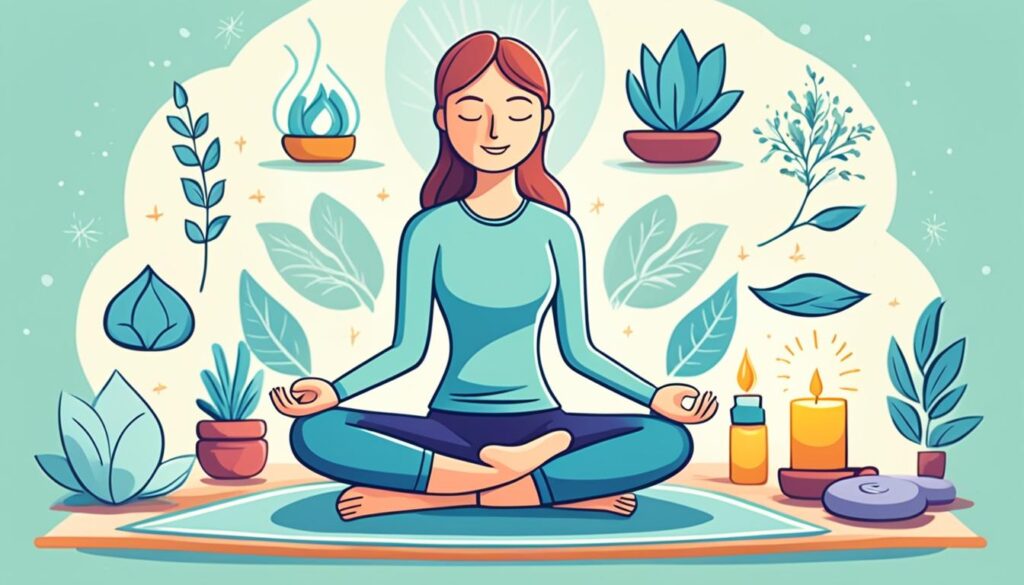
Regular Physical Activity
Moving your body is a great way to keep your blood pressure in check. You should aim for 90-150 minutes of activity every week. That’s about 30 minutes a day, 5 days a week. Activities like walking fast, jogging, swimming, or biking are good choices. They make your heart stronger and help you lose weight, which lowers your blood pressure.
Even small exercises like sitting down and moving your arms can help if you have high blood pressure. For people with this issue, dropping just 5 pounds can make a difference. It may take 1 to 3 months of regular exercise before you see changes in your blood pressure. But the good news is, the benefits stick around if you keep moving.
It’s important to pick activities that you like and can do often. Doing both aerobic activities and weight training is best for your heart. If you’re used to sitting around a lot, try to stand up and move for 5-10 minutes every hour. This can really boost your health.
Always talk to a doctor if you’re not sure if you should exercise. Watching how hard your heart is working during your workout is also important. It keeps you safe and can help you avoid accidents.
- Get at least 150 minutes per week of moderate-intensity aerobic activity or 75 minutes per week of vigorous aerobic activity
- Include moderate- to high-intensity muscle-strengthening activity at least two days per week
- Consult a health care professional before starting a physical activity program if you have chronic conditions
- Use fitness trackers and health apps to monitor fitness progress and set specific goals
- Stay within 50 to 85 percent of your maximum heart rate during exercise
- Warm up and cool down before and after exercise to reduce the risk of injury or soreness
Being active is key to managing high blood pressure. Doing various exercises daily can really make a difference. It not only helps to lower your blood pressure but also makes your heart stronger.
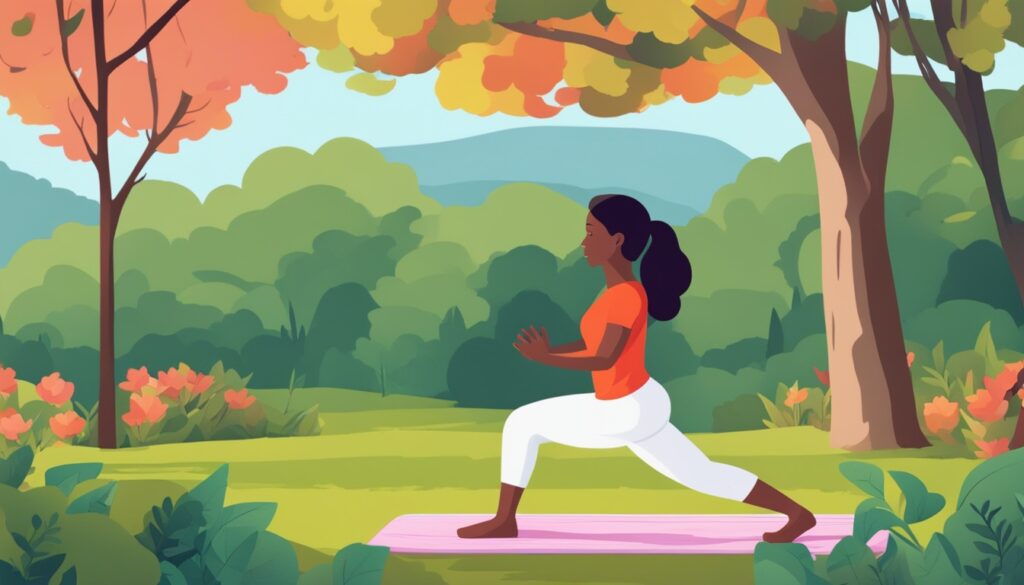
Immediate treatment for high blood pressure at home
Quick Home Remedies for Immediate Relief
Feeling a quick spike in blood pressure? No need to worry. There are fast home treatments that can instantly lower your blood pressure. They are great until you can see a doctor.
First, try to stay calm and lay down. Deep breaths can relax you and lower your blood pressure. Drink water too because being dehydrated can spike your pressure.
Other methods to quickly lower your pressure include a light walk, acupressure, or drinking hibiscus tea. Sunlight can also help. But remember, they’re not a doctor’s treatment. If they don’t work, see a doctor fast.
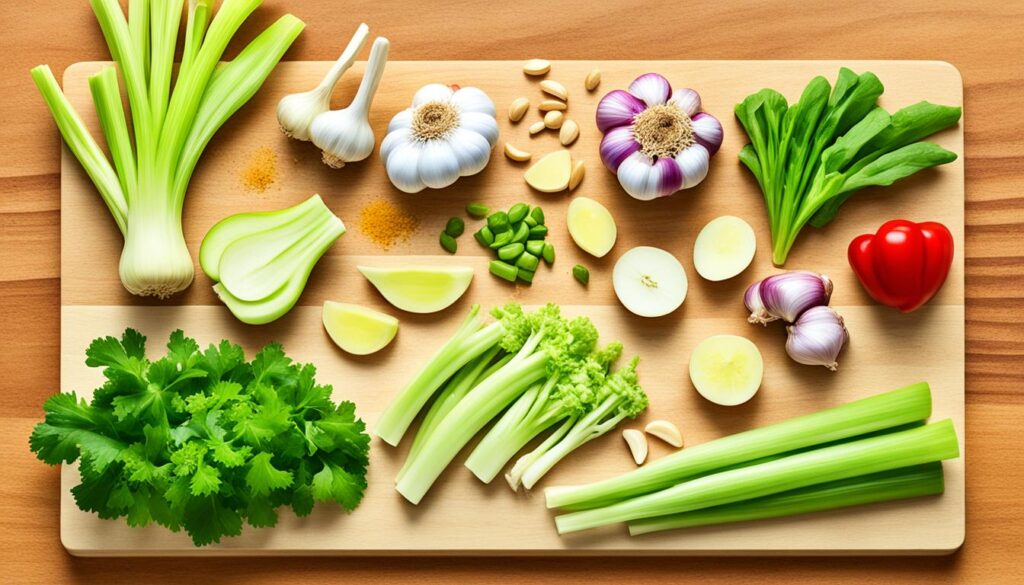
While these home tricks help with sudden pressure spikes, they’re not a medical cure. If your high blood pressure is ongoing or severe, speaking with a doctor is key. They can help find solutions for you.
Weight Management Strategies
Maintaining a healthy weight is important for high blood pressure. If you are overweight or obese, your blood pressure might be high. Even losing a little weight can help lower it. You should eat a balanced, low-sodium diet, exercise regularly, and keep an eye on your waist size.
If you’re too heavy, shedding 10 pounds or more can drop your blood pressure. Studies show that low-carb and low-fat diets can help. They reduced blood pressure after 6 months.
Exercising is key too. Try to do 2.5 hours of moderate exercise each week. This means about 30 minutes a day, 5 days a week.
- Take up aerobic activities like brisk walking, swimming, or cycling to burn more calories and boost heart health.
- Strength training helps you gain muscle and speeds up your metabolism, making it easier to manage your weight.
- It’s also crucial to keep an eye on your waist size to control obesity and high blood pressure.
Eating healthy and staying active can help you reach a healthy weight. This helps lower your blood pressure and lessen the chance of obesity and hypertension.
Limiting Sodium and Alcohol Intake
Limiting your sodium intake and cutting back on drinking can lower high blood pressure. The American Heart Association says you should have no more than 1,500-2,300 mg of sodium each day. Too much sodium makes your body hold onto water, which raises your blood pressure.
Drinking in moderation is key. Too much alcohol can make your blood pressure go up. It also makes blood pressure drugs less effective. The American Heart Association advises women have just one drink a day, and men have up to two drinks.
To lower your sodium, try these tips:
- Check labels to keep snacks, sauces, dressings, and processed meats under 200 milligrams of sodium.
- Look for ready-to-eat meals that have 600 milligrams of sodium or less.
- The DASH diet can cut your systolic blood pressure by 8 to 14 points for some people.
Less sugar helps lower your blood pressure too. For example, cutting out 2.3 teaspoons of sugar a day can really help women with high blood pressure.
It’s important to keep an eye on sodium and alcohol, and make other healthy changes. Doing these things can really help manage high blood pressure and lower your risk of serious health issues.
The Role of Potassium and Other Minerals
Keeping your blood pressure healthy is important for feeling good. One big helper here is potassium. It helps balance the salty effects of sodium. This can lower your blood pressure. Potassium does this by helping your body flush out extra sodium. This makes it easier on your blood vessels.
Potassium-Rich Foods
Eating more foods rich in potassium is a smart move if you’re watching your high blood pressure. It’s also good for keeping your heart strong. Here are some top potassium sources:
- Fruits and vegetables, such as spinach, broccoli, bananas, and oranges
- Dairy products
- Tuna, salmon, and other fatty fish
- Nuts and seeds
But it’s not just potassium that’s good for blood pressure. Minerals like magnesium and calcium help, too. A diet full of potassium-rich foods for blood pressure is a great start. It helps you stay healthy and lowers heart risk.
Quit Smoking for Better Heart Health
Do you have high blood pressure? Quitting smoking could make a big difference in your heart health. Smoking is a big reason for high blood pressure and heart problems. Every time you smoke, your blood pressure and heart rate go up. Smoking a lot can keep them high.
But here’s the good part. When you quit smoking, your heart and health can improve a lot. It lowers your risk of heart disease and stroke. Getting help to quit can really help, especially for people with high blood pressure. So, it’s a good step for better heart health.
The Impact of Smoking on Blood Pressure
Cigarettes have nicotine, and that’s not good for your heart. It makes your blood pressure and heart rate higher. This raises your chances of getting high blood pressure and heart disease. Smoking also makes your arteries narrow and your blood clot more. This puts you at risk for heart attacks and strokes.
Overcoming the Challenges of Quitting
Quitting is tough. Many people try to quit smoking three times before it really sticks. You may feel bad when you stop, like wanting to smoke more, feeling grumpy, or not being able to think right. But with help, you can do it. And quitting is great for your heart and health.
Quit Smoking with Support
- Think about using things like gum or patches that help with nicotine to ease off smoking.
- Get help from your family, friends, or doctor to keep you going strong and on track.
- Check out special programs or hotlines for quitting smoking, like SAMHSA’s 24/7 helpline (800-662-HELP).
Stopping smoking is a big deal for your heart and high blood pressure. It’s a key step for a brighter, healthier future.
When to Seek Medical Attention
If you face serious issues from high blood pressure, like a stroke, get help right away. Don’t try to fix it on your own. Health experts can make a plan for you that might need changes in how you live, what you eat, or even medicine. They will help watch your health closely to avoid problems.
A hypertensive crisis is a sudden and dangerous jump in blood pressure. This can harm organs like your heart or brain. It’s critical to know if you are at risk and what to do if your blood pressure goes way up.
If your blood pressure is very high and you feel unwell, don’t wait. Go see a doctor fast, especially if you have chest pain, can’t breathe well, or show signs of a stroke. You might need to stay in the hospital for a bit. The doctors will help fix your blood pressure with the right medicines to protect your body.
Staying on top of your health with regular visits to the doctor is key. Your healthcare provider will figure out what kind of high blood pressure you have and work out a plan just for you.
Conclusion
To stay healthy, you’ll need to do a few things. Use quick fixes at home, change your habits for good, and see your doctor often. Quick fixes help a bit, but you need to change how you live for a long-term better health.
Eat foods full of good stuff, move your body often, and ease your mind. Stop smoking and those bad habits. This can help you keep your blood pressure down and lower the chance of bad health issues.
High blood pressure usually doesn’t show signs until it’s quite serious. So, check in with your doctor often. They will work with you to find the best plan for your health. Keeping a close eye on your blood pressure is key.
Being patient is a big part of dealing with high blood pressure. Yet, the pay-off is a healthier you. Use home fixes, lifestyle changes, and help from your doctor. Together, they lead to a heart-healthy future you’ll enjoy.
FAQ
What is high blood pressure?
High blood pressure, known as hypertension, affects 122 million Americans. Many don’t know they have it. It’s called the “silent killer”. It can cause heart disease, stroke, and more.
What are the different stages of high blood pressure?
Hypertension has different stages based on blood pressure readings. Stage 1 is 130-139/80-89 mmHg. Stage 2 is 140/90 mmHg or higher. It can lead to serious health problems if not treated.
What are some immediate home remedies to lower high blood pressure?
Dealing with high blood pressure at home? Start by staying calm and lying down. Deep breaths, drinking water, and a short walk can help. Trying acupuncture or having hibiscus tea might also provide some relief.
What lifestyle changes can help manage high blood pressure in the long-term?
Maintaining a healthy weight and staying active are key. Managing stress and stopping smoking matter a lot. Eating heart-healthy foods like those in the DASH diet is also important.
How can the DASH diet help control high blood pressure?
The DASH diet helps a lot with high blood pressure. It focuses on fruits, veggies, and low-fat dairy. It also limits salt, sugar, and fatty foods. Following this diet can lower your blood pressure over time.
How can stress and anxiety affect high blood pressure?
Stress and anxiety can raise your blood pressure. Techniques like deep breathing, meditation, and yoga can help calm you down. They activate your parasympathetic nervous system, which can lower blood pressure.
How can regular physical activity help manage high blood pressure?
Being active helps a lot with high blood pressure. Aim for 30 minutes a day, at least 5 days a week. Things like walking, jogging, or swimming are good. They make your heart stronger and can help you lose weight.
What are some quick home remedies to lower high blood pressure immediately?
Start by staying calm and lying down if your blood pressure is high. Deep breaths, water, walking, and other steps can help temporarily. If these don’t work, see a doctor to check what’s best for you.
How can maintaining a healthy weight help manage high blood pressure?
Keeping a healthy weight is crucial for high blood pressure. Even losing a little weight can lower it. Be sure to eat well, exercise, and keep an eye on your waist size.
How can reducing sodium and alcohol intake help lower high blood pressure?
Less salt and alcohol can bring your blood pressure down. Aim to eat less than 2,300 mg of salt a day. Too much salt makes your body hold more water, raising blood pressure. Alcohol in moderation, or not drinking, is also good for managing blood pressure.
What is the role of potassium and other minerals in managing high blood pressure?
Potassium can help lower high blood pressure by countering sodium’s effects. It makes your blood vessels less stressed. Foods rich in potassium include many fruits and vegetables, as well as milk, fish, nuts, and seeds.
How does quitting smoking benefit high blood pressure?
For high blood pressure and heart health, quitting smoking is top priority. Each cigarette spikes your blood pressure. Stopping lowers your risk of serious health issues, like heart disease and stroke.
When should you seek medical attention for high blood pressure?
If high blood pressure causes serious issues like a heart attack, get help right away. Don’t try to fix it at home. For those with high blood pressure but no big problems, a doctor can guide on lifestyle and treatment options.
Source Links

This article is medically reviewed by Dr. Chandril Chugh, Board-Certified Neurologist, providing expert insights and reliable health information.
Dr. Chandril Chugh is a U.S.-trained neurologist with over a decade of experience. Known for his compassionate care, he specializes in treating neurological conditions such as migraines, epilepsy, and Parkinson’s disease. Dr. Chugh is highly regarded for his patient-centered approach and dedication to providing personalized care.





